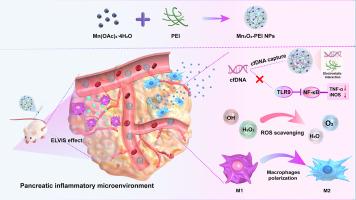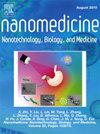Dual-scavenging Mn3O4-PEI nanoparticles targeting ROS and cfDNA for acute pancreatitis therapy
IF 4.6
2区 医学
Q2 MEDICINE, RESEARCH & EXPERIMENTAL
Nanomedicine : nanotechnology, biology, and medicine
Pub Date : 2025-08-01
DOI:10.1016/j.nano.2025.102848
引用次数: 0
Abstract
Acute pancreatitis (AP) is a common inflammatory disease that seriously threatens people's lives and health. Excessive reactive oxygen species (ROS) and cell-free DNA (cfDNA) are significant contributors to the advancement of AP. In this study, a nanoparticle with a dual function to clear ROS and cfDNA was developed for the treatment of acute pancreatitis. Cationic polyethyleneimine (PEI) was used to modify Mn3O4, resulting in the creation of Mn3O4-PEI nanoparticles, which exhibited strong binding to cfDNA and the ability to scavenge ROS. In vitro, Mn3O4-PEI showed significant inhibition of ROS and cfDNA-induced inflammation and demonstrated therapeutic effects in a model of acute pancreatitis induced by sodium taurocholate (STC). This research introduces a new nanomedicine approach for the treatment of AP.

靶向ROS和cfDNA的双清除Mn3O4-PEI纳米颗粒治疗急性胰腺炎。
急性胰腺炎(AP)是一种常见的炎症性疾病,严重威胁着人们的生命和健康。过量的活性氧(ROS)和无细胞DNA (cfDNA)是AP进展的重要因素。在本研究中,一种具有清除ROS和cfDNA双重功能的纳米颗粒被开发用于治疗急性胰腺炎。利用阳离子聚乙烯亚胺(PEI)修饰Mn3O4,制备出Mn3O4-PEI纳米颗粒,该纳米颗粒与cfDNA结合较强,并具有清除ROS的能力。在体外,Mn3O4-PEI对ROS和cfdna诱导的炎症有明显的抑制作用,并在牛磺胆酸钠(STC)诱导的急性胰腺炎模型中显示出治疗效果。本研究介绍了一种新的纳米药物治疗AP的方法。
本文章由计算机程序翻译,如有差异,请以英文原文为准。
求助全文
约1分钟内获得全文
求助全文
来源期刊
CiteScore
11.10
自引率
0.00%
发文量
133
审稿时长
42 days
期刊介绍:
The mission of Nanomedicine: Nanotechnology, Biology, and Medicine (Nanomedicine: NBM) is to promote the emerging interdisciplinary field of nanomedicine.
Nanomedicine: NBM is an international, peer-reviewed journal presenting novel, significant, and interdisciplinary theoretical and experimental results related to nanoscience and nanotechnology in the life and health sciences. Content includes basic, translational, and clinical research addressing diagnosis, treatment, monitoring, prediction, and prevention of diseases.

 求助内容:
求助内容: 应助结果提醒方式:
应助结果提醒方式:


